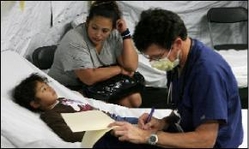Drive-thru hospitals
Published: Sunday | October 4, 2009

AP photo
Dr Scott Nowlin filling out paperwork after examining three-year-old Royanna Ayala inside one of the flu tents located at the Dell Children's Hospital in Austin, Texas.
AP:
Fast-food places have them. Banks and pharmacies do, too. Now hospitals are opening drive-thrus and drive-up tent clinics to screen and treat a swelling tide of swine flu patients.
Call it McTriage. And yes, you can get Tamiflu with that - if you're sick enough to need it. Most people aren't.
The idea behind these efforts is to keep coughing, feverish people out of regular emergency rooms, where they can infect heart attack victims and other very sick patients. The need has soared in recent weeks as flu has spread among schoolchildren before vaccine is available.
In Austin, Texas, Dell Children's Medical Center had nearly 400 ER visits on Sunday alone, mostly kids with swine flu. Dozens were diverted to two tents outside, and there are plans to add a third.
Tents
In Memphis, Tenn., Le Bonheur (pronounced luh-BAHN-uhr) Children's Hospital has had more than 5,500 kids with flu-like illness seek emergency care since August 1. The hospital set up tents outside its ER on September 11 and already has treated more than 900 cases in them.
Hope and Billy Howard took their three-year-old daughter, Emma Smith, to one on Sunday. The little girl had a fever that would not break with over-the-counter medicine, complained of belly pain and refused to eat, and her parents could not reach her paediatrician.
"I didn't know what to give her, and I didn't want to take any chances," her mother said. At the tent ER, "we were in and out in 15 minutes."
Sick families
Entire families who are sick have shown up at Bayne-Jones Army Community Hospital in Fort Polk, La., near the Texas state line.
"They just drive up in their pyjamas," said Henry Johnson, a physician's assistant who helped start a tent system there. People pull up, park and go through three tents, where they undergo an exam that includes having their temperature taken. They are usually sent home, with prescriptions if needed.
"It's working out for us - nothing but rave reviews," he said.
Very few patients have needed to be admitted, doctors running these programmes say.
Jim Bentley, policy chief at the American Hospital Association, said many hospitals are trying novel ways to care for more people than their emergency rooms can handle, especially children.
"You're dealing often with anxious patients who want to know is it OK to care for them at home" versus the hospital, he said. "One thing a tent offers is a less intimidating atmosphere to the child," as opposed to an emergency room with its beeps and other noises and scary trauma cases, he said.
